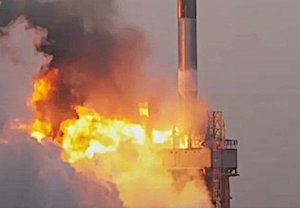After a rocket engine exploded during a launch test at the UK’s new spaceport in Shetland on Monday, the CEO of SaxaVord Spaceport has warned: “This anomaly was inevitable and there will be more.”
The test was being carried out by German company Rocket Factory Augsburg (RFA), which has plans to launch the UK’s first vertical rocket into orbit.
Monday’s nine-engine test on the island of Unst in the north of the Shetlands, was one of the trials due to be carried out before progressing to launch.
RFA said the “anomaly” had led to “the loss of the stage” and there were no injuries.
SaxaVord Spaceport CEO Frank Strang said: “On Monday night our client RFA conducted a full nine-engine test of their first stage on the launch stool at SaxaVord Spaceport.
“Unfortunately there was an anomaly which resulted in a fire on the stool. These tests are designed to identify faults and issues prior to a full test flight campaign and are all carried out in a highly controlled and regulated environment.
“It is far too early to know what caused the anomaly but I am confident that once RFA get to the bottom of it they will rectify the situation and carry on with their programme.
“Like all in the sector their team are passionate, committed and ultra professional in how they go about their business and we at SaxaVord have nothing but praise for all of them.
“Because our own personnel carried out their duties and roles professionally and with their normal good natured approach nobody was injured or hurt.
“They followed the protocols set down under our Spaceport Licence and supervised by the Spaceport Manager Dave Barr carried the SaxaVord flag proudly.
“As CEO I can only express my gratitude to them all. Space is a high risk / high reward sector and there will be lots of highs and lows in all our journeys.
“This anomaly was inevitable and there will be more. As long as we all do our jobs to the best of our ability then they will be resolved, we will all learn and SaxaVord Spaceport and the space economy will grow.
“Followers of SpaceX will know that in their early days they had several ‘moments’ resulting in damage to both launch pads and launch vehicles but now with over 90 launches last year they have proven that space transportation is as reliable and safe as any other form of transport.
“As ever we will use this as a learning experience we will work with RFA to help them in any way that we can and we will look forward to those first launches from the UK with eager anticipation.”
RFA said it was working with the spaceport and authorities to find the cause of the failure.
The company’s spokesperson said: “We develop iteratively with an emphasis on real testing.
“This is part of our philosophy and we were aware of the higher risks attached to this approach. Our goal is to return to regular operations as soon as possible.”
